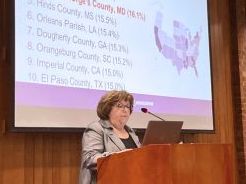Dementia Series Helps Caregivers Navigate Memory Loss
May 29, 2024 Laura Lee
The Graduate School’s Geriatrics and Gerontology Education and Research Program hosted a “Navigating Dementia” education series for the public.
Photo: Ilene Rosenthal, director, Greater Maryland Alzheimer's Association, presents at the GGEAR “Navigating Dementia” conference.
For Carla Rawlings, a retired social worker now caring for her mother with dementia, a University of Maryland Graduate School conference offered valuable insight into managing her mother’s worsening memory loss.
Rawlings attended the May 10 “Assessment Tools” workshop, part of the Geriatrics and Gerontology Education and Research (GGEAR) Program's five-part “Navigating Dementia” series. Hosted by GGEAR with support from the Maryland Department of Aging, the community education series aims to provide support and resources to caregivers, aging services professionals, and anyone with an interest in matters concerning older adults.
“She's strong-willed,” said Rawlings, who monitors her mother on an in-home camera system linked to her phone. “And she doesn’t recognize that she has memory loss. She'll say, ‘What are you fixing for dinner and then five to 10 minutes later she’ll ask, ‘What are you fixing for dinner?’ ”
Across Maryland, there are an estimated 110,000 people over 65 living with Alzheimer’s or related dementias and nearly 240,000 unpaid family members proving care. Nationwide, nearly 7 million Americans have dementia, a number projected to rise rapidly as the population ages, according to the Alzheimer’s Association.
“Dementia represents a public health crisis that will only intensify,” said keynote speaker Ilene Rosenthal, MSW, director of the Greater Maryland Alzheimer’s Association. “Early detection allows patients to access treatments and plan for their future care needs.”
The conference covered screening methods that can detect early signs like struggling with finances or medications — signs often missed as merely “senior moments.”
“There is a lack of awareness about what symptoms signal dementia rather than typical age-related changes,” said Rachel McPherson, PhD, a postdoctoral fellow at the University of Maryland School of Nursing who discussed a screening tool called the AD8, an eight-item questionnaire designed to screen for mild dementia. “Raising awareness and increasing screenings could allow more timely diagnosis.“
GGEAR director Diane Martin, PhD, MSL, MA, agrees that there is a fundamental lack of understanding of the aging process. “We’re raising awareness of the differences between normal aging and cognitive decline indicating underlying dementia," Martin said. “Our goal is to promote earlier detection and better care for this growing population.“